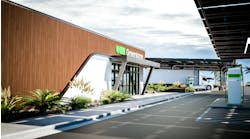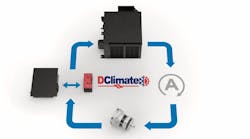DTNA eyes plan to give EV batteries second chance
Daimler Truck North America (DTNA) is working to integrate a “comprehensive circular economy” across its operations. The process will focus on recycling the rare-earth materials and products found in lithium-ion electric vehicle batteries such as cobalt and nickel.
“As part of our commitment to maximizing material life cycles, we meticulously assess environmental and ethical implications from sourcing to post-production,” said Rakesh Aneja, vice president and chief of Zero-Emission Transformation Group at DTNA. “Our primary goal is to repair our lithium-ion battery materials and reduce the consumption of new resources.”
The company stated that it can use technology to discern when an EV battery no longer meets the required standards for vehicle operations, at which point they will work to repair, remanufacture, repurpose, and recycle the battery’s materials.
For battery materials that can be remanufactured, DTNA will utilize its established remanufacturing process at existing Detroit Diesel Remanufacturing locations, such as the Hibbing facility. These locations will partially disassemble components, replace modules, and test each component to ensure it meets the same standards as new products. For now, DTNA will work to remanufacture Detroit batteries and eAxles, the company stated, but may expand the program in the future.
Read more: Volvo, Daimler Truck partner to standardize software-defined truck platform
To repurpose batteries that are not fit to go back into a vehicle, DTNA is partnering with Nuvation Energy to pilot a battery energy storage system (BESS). This system will be designed to assist in vehicle charging, peak shaving, backup storage, and microgrid scenarios.
“We’re thrilled to announce the incorporation of DTNA’s first battery energy storage system units, designed by Nuvation Energy using Detroit battery modules, at Electric Island later this year,” Aneja stated. “Battery energy storage systems play a pivotal role in the electric vehicle ecosystem, given the escalating demand for charging infrastructure and limitations of the current power grid. Energy storage systems alleviate this issue by facilitating off-peak charging, utilizing stored power when needed, and reducing reliance on the grid.”
Finally, DTNA is partnering with Li-Cycle, a lithium-ion battery resource recovery company, to recycle battery materials once the devices themselves reach the end of their useful lives. This process entails using a liquid-based solution to recycle battery materials, DTNA explained.
If successful, the company hopes to its remanufacturing, repurposing, and recycling program beyond EV materials.
“This circular approach extends beyond just batteries,” Aneja noted. “We are actively working to apply this concept to other facets of our product development, aiming to increase our utilization of reusable or recyclable materials.”




